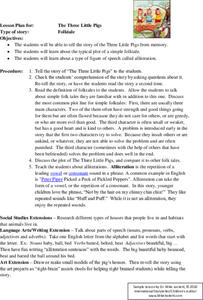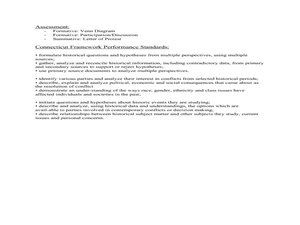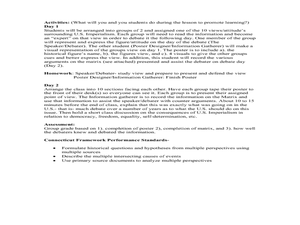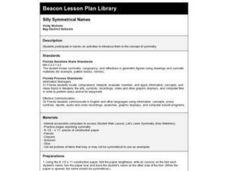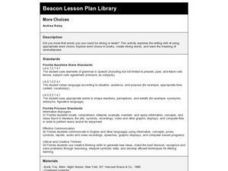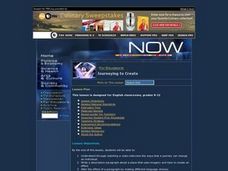Curated OER
The Three Little Pigs
Students read the story The Three Little Pigs and complete language activities about them. For this The Three Little Pigs lesson plan, students research houses, draw houses, and write alliteration poems.
Curated OER
Norse Mythology
Third graders read several selections of Norse mythology and compare this mythology to others studied in the past. They are introduced to runes. They read poetry and compile a class book of favorite poems. They define idioms and cite...
Curated OER
Martin Luther King, Jr. vs. Malcolm X
Eleventh graders compare and contrast the visions of Martin Luther King, Jr. and Malcolm X. In this African-American history lesson, 11th graders read speeches by each of the men and summarize the arguments made by each of them about...
Curated OER
Views Concerning U.S. Imperialism after the Spanish-American War
Students research the impact of American Imperialism. In this Spanish-American War lesson, students visit the listed Web sites to discover details about the war and its effects. Students use the information they locate to participate in...
Curated OER
Budgeting for Peace
Students explore world leader's quests for peace. In this world leader research lesson, students read a speech by Archbishop Desmond Tutu and view budget figures for the United States. Students work in groups to create an alternate...
Curated OER
It's Time to Open Wide for O
Young scholars recognize the short vowel o in written and spoken language. Through listening and decoding activities, they discriminate the vowel sound /o/ from other phonemes. Students match the phoneme and letter in words they read on...
Curated OER
Silly Symmetrical Names
Fourth graders participate in hands-on activities to introduce them to the concept of symmetry. They make a silly symmetrical picture out of their names after gluing them onto a larger sheet of construction paper. This is a really...
Curated OER
Combining Direct and Indirect Object Pronouns
Young scholars combine direct and indirect pronouns in this lesson. They practice with rewriting sentences when a direct and indirect object is present. They create a story using PowerPoint with their new sentences.
Curated OER
Mighty Metaphors
Fourth graders explore metaphors and then complete a worksheet on which they write metaphors. They may illustrate the metaphors.
Curated OER
Emotion Similes
Students define what a simile is before writing a poem that is based primarily on similes. They brainstorm and write the poem using the give format. They write drafts, revise and present a final poem.
Curated OER
Poetic Expression
Ninth graders evaluate the effectiveness of literary techniques including figurative language.
They demonstrate an understanding of the main ideas, events, or themes of a variety of novels, stories, poetry, other print material, and...
Curated OER
All Hands On Deck
Students study estuaries and are able to define one, and describe its features. In this investigative lesson students participate in an activity that shows them the importance of estuaries.
Curated OER
More Choices
Fourth graders create onomatopoeia for a variety of things such as a mean dog, a crying baby or a doorbell ringing after exploring word choice as used by authors in selected books. They complete a Word Choice worksheet that is attached.
Curated OER
Adjectives
Students add adjectives to a paragraph to make it more exciting and describing. In this adjectives lesson plan, students compare 2 paragraphs, one with adjectives and one without, and then add in their own to another paragraph.
Curated OER
Official Statements
Students research the viewpoints of famous Americans, and then write commencement speeches reflecting these viewpoints to be delivered to high school graduates of today.
Curated OER
History: Declaration of Conscience Political Cartoons
Pupils examine political cartoons depicting opinions about Margaret Chase Smith's Declaration of conscience. After examining the cartoons, they create their own political cartoons about the speech. As an ongoing activity, students...
Curated OER
Martin Luther King Jr. Who Is He?
Students describe MLk's leadership of the desegregation movement. Students discuss the meaning of non-violent revolution. Students identify the difference between their lives and those ofcitizens in 1963. Students write a short essay...
Curated OER
Prime Ministers On Line
Students explain the roles, responsibilities and contributions of Canadian Prime Ministers. They explore and explain Parliament Hill in terms of its history, traditions, and current functions through website activities and web links.
Curated OER
100 Remarkable People
Young scholars investigate a variety of important historical figures in order to present a report to the class. The use of internet research skills is reinforced for the beginning of the lesson plan and culminates in an oral presentation...
Curated OER
Index Card Jigsaw
High schoolers explore accomplishments of historical figures. Through participation in a hands-on activity, teams of students match names, quotes, views and political party affiliation to the correct picture. They create a chart from...
Curated OER
Celebrating African Americans and Coins
Young scholars examine the Booker T. Washington commemorative coin and listen to a biography of Washington's life. They develop a list of reasons why his life was commemorated with a coin. They examine other coins and the lives and work...
Curated OER
Journeying to Create
Show a video clip that descripes how taking a journey can change a person's outlook on life. Learners write a paragraph about a place that uses imagery and tone to create a specfic effect. They evaluate their journal entries as well.
Curated OER
Creating Characters
Students examine the methods of effective characterization. In this writing skills lesson, students discuss how emotions, dialogue, actions, and physical descriptions build believable characters. Students then use the methods of...
Curated OER
Two Sides, Same Coin: How Political Beliefs Influence Language Use
Learners read several magazine articles on the same topic written from different political perspectives, paying particular attention to the diction, syntax, and arguments presented in support the point of view expressed. They then select...
